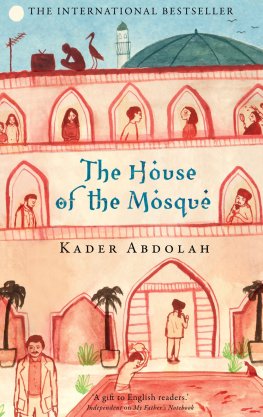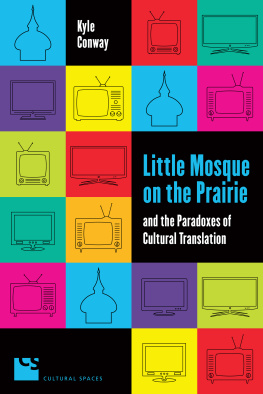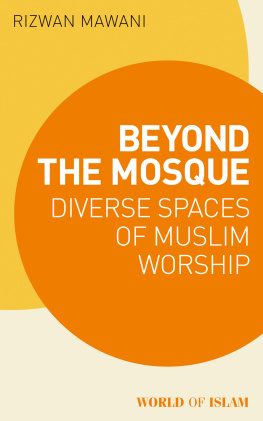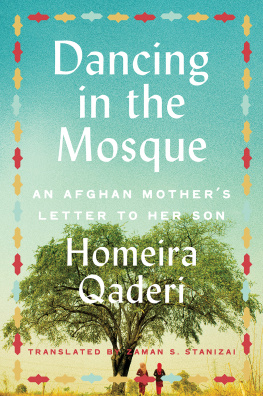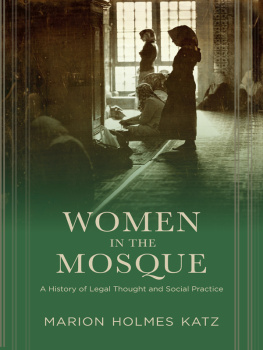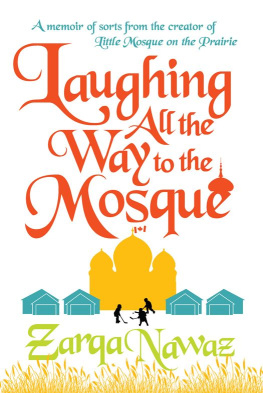Kader Abdolah
The House of the Mosque
To Aqa Jaan,
so I can let him go


Nun, wa alqalame wa ma yastorun.
By the pen and by what you write.
The Pen surah
Alef Lam Mim. There was once a house, an old house, which was known as the house of the mosque. It was a large house with thirty-five rooms. For centuries the house had been occupied by successive generations of the family who served the mosque.
Each room had been named according to its function: the Dome Room, for example, or the Opium Room, the Storytelling Room, the Carpet Room, the Sick Room, the Grandmothers Room, the Library and the Crows Room.
The house lay behind the mosque and had actually been built onto it. In one corner of the courtyard was a set of stone steps leading up to a flat roof, which was connected to the mosque.
In the middle of the courtyard was a hauz, a hexagonal basin of water in which people washed their hands and face before prayers.
The house was now occupied by the families of three cousins: Aqa Jaan, the merchant who presided over the citys bazaar, Alsaberi, the imam of the house and spiritual leader of the mosque, and Aqa Shoja, the mosques muezzin.
It was a Friday morning in early spring. The sun felt warm, the air was filled with the rich smell of earth, the trees were in leaf, and the plants were beginning to bud. Birds flew from branch to branch, serenading the garden. The two grandmothers were pulling out the plants that had died in the winter, while the children chased each other and hid behind the thick tree trunks.
An army of ants crawled out from under one of the ancient walls and covered the path by the old cedar tree like a moving brown carpet. Thousands of young ants, seeing the sun for the first time and feeling its warmth on their backs, surged down the path.
The houses cats, stretched out by the hauz, looked in surprise at the teeming mass. The children stopped playing to stare at the wondrous sight. The birds fell silent and perched in the pomegranate tree, craning their necks to follow the ants progress.
Grandmother, the children cried, come and look!
The grandmothers, who were working on the other side of the garden, went on with their digging.
Come and look! one of the girls repeated. There are millions of ants!
The grandmothers came over to investigate. Ive never seen anything like it! exclaimed one.
Ive never even heard of such a thing! exclaimed the other. Their hands flew to their mouths in astonishment.
The mass of ants was growing larger every second, making it impossible to get to the front gate.
The children raced over to Aqa Jaans study, on the other side of the courtyard.
Aqa Jaan! Help! We have ants!
Aqa Jaan parted the curtains and looked outside.
Whats wrong?
Please come! Soon we wont be able to reach the door. There are millions of ants crawling towards the house. Millions!
Im coming.
He threw his long aba around his shoulders, put on his hat and went into the courtyard. Aqa Jaan had witnessed a lot in the house, but never anything like this.
It reminds me of the Prophet Solomon, he said to the children. Something must have set them off or they wouldnt be swarming in such numbers. If you listen hard enough, you can hear them talking to each other. Unfortunately we dont speak their language. Solomon could talk to ants. I cant. I think they must be performing some kind of ritual, or perhaps spring has triggered a change in their nest.
Do something! said Golebeh, the younger of the two grandmothers. Make them go back to their nest before they get into the house!
Aqa Jaan knelt, put on his glasses and examined the ants up close.
Then Golbanu, the older grandmother, made a suggestion. Recite the surah about Solomon talking to the ants the swarms of ants that covered the valley and brought Solomons army to a halt. Or read the Al-Naml surah, the part where Solomon talks to the hoopoe bird that brings him a love letter from the queen of Sheba.
The children waited, curious to see what Aqa Jaan would do.
Read Al-Naml before its too late! Golbanu insisted. Tell the ants to go back to their nest!
The children looked expectantly at Aqa Jaan.
At least read the love letter, she pleaded. If you dont, the ants will take over the house!
There was a long pause.
Bring me the Koran, Aqa Jaan said at last.
Shahbal, one of the boys, ran over to the hauz, washed his hands, dried them on a towel that was hanging on the clothes-line and hurried into Aqa Jaans study. He returned with a very old Koran and handed it to Aqa Jaan.
Aqa Jaan leafed through it in search of the Al-Naml surah and stopped at page 377. Bowing slightly, he began to chant softly, Hattaa, edha ataa ala wade an-namle, qalat namlaton: ya ayyoha an-namlo od kholaa masaakenakum, la yahtemannakom solaymano wa jonuudoho, wahum la yashoruun.
They all watched in silence, waiting to see what the ants would do.
Aqa Jaan chanted some more and blew on the ants. The grandmothers fetched two braziers and threw a handful of esfandi seeds on the freshly laid fires, so that clouds of scented smoke billowed into the air. They knelt on the ground beside Aqa Jaan and blew the smoke towards the ants, chanting, Solomon, Solomon, Solomon, ants, ants, ants, the valley, the hoopoe, the queen of Sheba. Sheba, Sheba, Sheba, Solomon, Solomon, Solomon, the hoopoe, the hoopoe, ants, ants, ants.
The children waited anxiously to see what would happen.
Suddenly the creatures stopped. They seemed to be listening, as if they wanted to know who was chanting and blowing that fragrant esfandi smoke at them.
Clear the courtyard, children! said Golbanu. The ants are turning back! We dont want to upset them!
The children trooped upstairs and stared out of the windows to see if the ants had really turned back.
Years later, after Shahbal had left the country and was living in a foreign land, he shared his memory of that day with his friends. After the surah had been read, he told them, he had seen with his own eyes how the ants had crawled like long brown ropes back into the crevices in the ancient wall.
For an explanation of foreign words see the glossary at the back.
Alef Lam Ra. Years went by, but never again had the ants crept out from under the ancient walls in such numbers. The event had become a distant memory. Inside the tradition-bound house life went on as usual.
In the evenings the grandmothers busied themselves in the kitchen until Alsaberi, the imam of the mosque, came home and they had to get him ready for the evening prayer at the mosque.
The old crow flew over the house and cawed. A carriage pulled up outside, and Golbanu rushed over to open the gate for Imam Alsaberi.
The ageing coachman greeted her and drove off. He was the last of his kind, because horses had been banned from the city streets. Any coachman who managed to get his driving licence was given a subsidised taxi, but there was one old coachman who repeatedly failed the test. At Aqa Jaans request, the man was finally given permission to work as the mosques coachman. Alsaberi considered taxis unclean, and he also felt that it was unseemly for an imam to have himself driven around in a taxi like an ordinary person.
Alsaberi was wearing a black turban a sign that he was a direct descendant of the Prophet Muhammad and a clerics long brown

